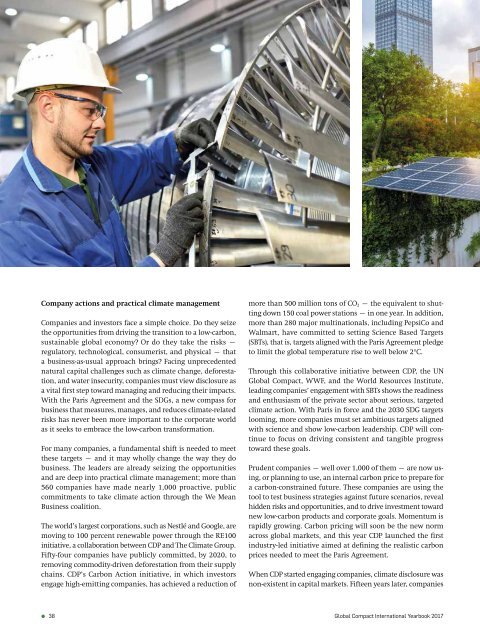Sustainability in Troubled Times
We live in times of uncertainty and global (dis)order. „Understanding global mega-trends is crucial. We live in times of multiple, evolving and mutually-reinforcing shifts“, says UN Secretary-General António Guterres. He adds: „These dynamics, of geopolitical, demographic, climatic, technological, social and economic nature, enhance threats and opportunities on an unprecedented scale.“ Therefore sustainability in troubled times is the key topic of this Sustainability Yearbook 2017, edited by macondo publishing. In the opening essay, Elmer Lenzen takes a critical look at the relationship between democracy and globalization. For decades this combination was a formula for success. Now both are experiencing troubled times. UN Global Compact founding director Georg Kell and Princeton professor Larry Diamond, who are well- known figures in this field, explain some of the reasons why in a profound interview. One reason is that today’s world is becoming more fragmented. So how can sustainability work in these times? It can work if we focus on the needs of the present without compromising the abilities of the future, says Global Compact Action Platform fellow Richard Roberts, and by utilizing the advantages of tomorrow. But doing the right thing in critical times is also a question of attitude. The entrepreneur Richard Branson and the actor Colin Firth both show in their own ways that sustainability means authenticity.
We live in times of uncertainty and global (dis)order. „Understanding global mega-trends is crucial. We live in times of multiple, evolving and mutually-reinforcing shifts“, says UN Secretary-General António Guterres. He adds: „These dynamics, of geopolitical, demographic, climatic, technological, social and economic nature, enhance threats and opportunities on an unprecedented scale.“ Therefore sustainability in troubled times is the key topic of this Sustainability Yearbook 2017, edited by macondo publishing.
In the opening essay, Elmer Lenzen takes a critical look at the relationship between democracy and globalization. For decades this combination was a formula for success. Now both are experiencing troubled times. UN Global Compact founding director Georg Kell and Princeton professor Larry Diamond, who are well- known figures in this field, explain some of the reasons why in a profound interview. One reason is that today’s world is becoming more fragmented. So how can sustainability work in these times?
It can work if we focus on the needs of the present without compromising the abilities of the future, says Global Compact Action Platform fellow Richard Roberts, and by utilizing the advantages of tomorrow. But doing the right thing in critical times is also a question of attitude. The entrepreneur Richard Branson and the actor Colin Firth both show in their own ways that sustainability means authenticity.
Create successful ePaper yourself
Turn your PDF publications into a flip-book with our unique Google optimized e-Paper software.
Company actions and practical climate management<br />
Companies and <strong>in</strong>vestors face a simple choice. Do they seize<br />
the opportunities from driv<strong>in</strong>g the transition to a low-carbon,<br />
susta<strong>in</strong>able global economy? Or do they take the risks –<br />
regulatory, technological, consumerist, and physical – that<br />
a bus<strong>in</strong>ess-as-usual approach br<strong>in</strong>gs? Fac<strong>in</strong>g unprecedented<br />
natural capital challenges such as climate change, deforestation,<br />
and water <strong>in</strong>security, companies must view disclosure as<br />
a vital first step toward manag<strong>in</strong>g and reduc<strong>in</strong>g their impacts.<br />
With the Paris Agreement and the SDGs, a new compass for<br />
bus<strong>in</strong>ess that measures, manages, and reduces climate-related<br />
risks has never been more important to the corporate world<br />
as it seeks to embrace the low-carbon transformation.<br />
For many companies, a fundamental shift is needed to meet<br />
these targets – and it may wholly change the way they do<br />
bus<strong>in</strong>ess. The leaders are already seiz<strong>in</strong>g the opportunities<br />
and are deep <strong>in</strong>to practical climate management; more than<br />
560 companies have made nearly 1,000 proactive, public<br />
commitments to take climate action through the We Mean<br />
Bus<strong>in</strong>ess coalition.<br />
The world’s largest corporations, such as Nestlé and Google, are<br />
mov<strong>in</strong>g to 100 percent renewable power through the RE100<br />
<strong>in</strong>itiative, a collaboration between CDP and The Climate Group.<br />
Fifty-four companies have publicly committed, by 2020, to<br />
remov<strong>in</strong>g commodity-driven deforestation from their supply<br />
cha<strong>in</strong>s. CDP’s Carbon Action <strong>in</strong>itiative, <strong>in</strong> which <strong>in</strong>vestors<br />
engage high-emitt<strong>in</strong>g companies, has achieved a reduction of<br />
more than 500 million tons of CO 2 – the equivalent to shutt<strong>in</strong>g<br />
down 150 coal power stations – <strong>in</strong> one year. In addition,<br />
more than 280 major mult<strong>in</strong>ationals, <strong>in</strong>clud<strong>in</strong>g PepsiCo and<br />
Walmart, have committed to sett<strong>in</strong>g Science Based Targets<br />
(SBTs), that is, targets aligned with the Paris Agreement pledge<br />
to limit the global temperature rise to well below 2°C.<br />
Through this collaborative <strong>in</strong>itiative between CDP, the UN<br />
Global Compact, WWF, and the World Resources Institute,<br />
lead<strong>in</strong>g companies’ engagement with SBTs shows the read<strong>in</strong>ess<br />
and enthusiasm of the private sector about serious, targeted<br />
climate action. With Paris <strong>in</strong> force and the 2030 SDG targets<br />
loom<strong>in</strong>g, more companies must set ambitious targets aligned<br />
with science and show low-carbon leadership. CDP will cont<strong>in</strong>ue<br />
to focus on driv<strong>in</strong>g consistent and tangible progress<br />
toward these goals.<br />
Prudent companies – well over 1,000 of them – are now us<strong>in</strong>g,<br />
or plann<strong>in</strong>g to use, an <strong>in</strong>ternal carbon price to prepare for<br />
a carbon-constra<strong>in</strong>ed future. These companies are us<strong>in</strong>g the<br />
tool to test bus<strong>in</strong>ess strategies aga<strong>in</strong>st future scenarios, reveal<br />
hidden risks and opportunities, and to drive <strong>in</strong>vestment toward<br />
new low-carbon products and corporate goals. Momentum is<br />
rapidly grow<strong>in</strong>g. Carbon pric<strong>in</strong>g will soon be the new norm<br />
across global markets, and this year CDP launched the first<br />
<strong>in</strong>dustry-led <strong>in</strong>itiative aimed at def<strong>in</strong><strong>in</strong>g the realistic carbon<br />
prices needed to meet the Paris Agreement.<br />
When CDP started engag<strong>in</strong>g companies, climate disclosure was<br />
non-existent <strong>in</strong> capital markets. Fifteen years later, companies<br />
38<br />
Global Compact International Yearbook 2017

















